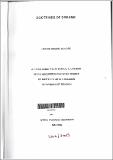| dc.description.abstract | Dreams according to Morton T. Kelsey are “any content that comes in sleep and is remembered.” Many are tribes in Africa that take the content of their dreams very seriously. Thus, in this study, the cultural approach of the Akamba people of Kenya, the Dida of Cote d’Ivoire, the Yakes of Zaire, the Apagibeti among the Sudanic Bantu, the Igbo of Nigeria, the Zezeru in Zimbabwe, the Mijikenda and Swahili of East Africa and various others will be exposed, explored and commented on in the third chapter of this work. One will definitely notice that those African approaches to dreams are closer, even somehow similar, to ones of the ancient Near Eastern and biblical cultural ones. Nevertheless, this study will go beyond the cultural similarities shared among Africans as mentioned above and propose both a psychoanalytical and modern psychology’s views on the origins, contents, and functions of dreams. Here are some theological doctrinal crucial questions that this study aims to bring to the attention and consideration of everyone interested in dream studies. Are dreams truly sent by the spirits of the ancestors are that is suggested by the writings of John Mbiti, Richard Geheman, Ledjou Gahi Aime and many others? Or speaking psychoanalytically, one may ask the following questions. Are dreams simply the visualization of one’s ego or subconscious? The biblical and theological questions about the doctrines of dreams would for instance be the following ones. What are the biblical teachings about dreams? Are people still experiencing prophetic or God-sent dreams like the ones told in Bible about Joseph the son of Jacob, Jacob himself, Nebuchadnezzar king of Babylon, Joseph the husband of Mary and various other biblical characters? What are the positions of some Church fathers about the human phenomenon of dreams? Why and how should one follow the instructions or contents of his or her dreams? As a whole, the study in its psychoanalytical, cultural and biblical investigations on the origins, contents and functions of dreams will propose some answers to some of the above pertinent questions. One of the African cultural approaches to dreams that motivated the writing of this academic writing, is the inclination of most of the African people to obey and carry out the contents of their dreams. Therefore, it is with this particular African cultural approach to dreams in mind that this study comes around to boldly voice out that God did indeed use and does still use dreams as one of his communication media with human beings. But fortunately enough not every dream is God-sent one. How can one then accurately differentiate a God-sent dream from either self-induced or vanity one? The answer to this very last question will be the ultimate quest of this study. It is a wish that the findings in this work will serve as a guiding material to pastors and counselors in their respective pastoral and clinical cares. For, trying to understand one’s dreams has always been part of the lives of millions of Africans and people of other continents. And as such, it is high time that African pastors, non- African pastors who work in Africa and counselors learned how to help the people placed under leadership to assess and understand their dreams. Fortunately enough, this is what this study is all about. | en_US |

